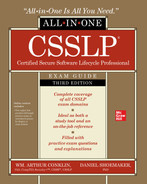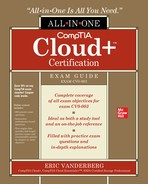Copyright 2015 by McGraw-Hill Education. All rights reserved. Except as permitted under the United States Copyright Act of 1976, no part of this publication may be reproduced or distributed in any form or by any means, or stored in a database or retrieval system, without the prior written permission of the publisher, with the exception that the program listings may be entered, stored, and executed in a computer system, but they may not be reproduced for publication.
ISBN: 978-0-07-183735-4
MHID: 0-07-183735-3
The material in this eBook also appears in the print version of this title: ISBN: 978-0-07-184124-5, MHID: 0-07-184124-5.
eBook conversion by codeMantra
Version 1.0
All trademarks are trademarks of their respective owners. Rather than put a trademark symbol after every occurrence of a trademarked name, we use names in an editorial fashion only, and to the benefit of the trademark owner, with no intention of infringement of the trademark. Where such designations appear in this book, they have been printed with initial caps.
McGraw-Hill Education eBooks are available at special quantity discounts to use as premiums and sales promotions, or for use in corporate training programs. To contact a representative please visit the Contact Us page at www.mhprofessional.com.
Information has been obtained by McGraw-Hill Education from sources believed to be reliable. However, because of the possibility of human or mechanical error by our sources, McGraw-Hill Education, or others, McGraw-Hill Education does not guarantee the accuracy, adequacy, or completeness of any information and is not responsible for any errors or omissions or the results obtained from the use of such information.
TERMS OF USE
This is a copyrighted work and McGraw-Hill Education and its licensors reserve all rights in and to the work. Use of this work is subject to these terms. Except as permitted under the Copyright Act of 1976 and the right to store and retrieve one copy of the work, you may not decompile, disassemble, reverse engineer, reproduce, modify, create derivative works based upon, transmit, distribute, disseminate, sell, publish or sublicense the work or any part of it without McGraw-Hill Educations prior consent. You may use the work for your own noncommercial and personal use; any other use of the work is strictly prohibited. Your right to use the work may be terminated if you fail to comply with these terms.
THE WORK IS PROVIDED AS IS. McGRAW-HILL EDUCATION AND ITS LICENSORS MAKE NO GUARANTEES OR WARRANTIES AS TO THE ACCURACY, ADEQUACY OR COMPLETENESS OF OR RESULTS TO BE OBTAINED FROM USING THE WORK, INCLUDING ANY INFORMATION THAT CAN BE ACCESSED THROUGH THE WORK VIA HYPERLINK OR OTHERWISE, AND EXPRESSLY DISCLAIM ANY WARRANTY, EXPRESS OR IMPLIED, INCLUDING BUT NOT LIMITED TO IMPLIED WARRANTIES OF MERCHANTABILITY OR FITNESS FOR A PARTICULAR PURPOSE. McGraw-Hill Education and its licensors do not warrant or guarantee that the functions contained in the work will meet your requirements or that its operation will be uninterrupted or error free. Neither McGraw-Hill Education nor its licensors shall be liable to you or anyone else for any inaccuracy, error or omission, regardless of cause, in the work or for any damages resulting therefrom. McGraw-Hill Education has no responsibility for the content of any information accessed through the work. Under no circumstances shall McGraw-Hill Education and/or its licensors be liable for any indirect, incidental, special, punitive, consequential or similar damages that result from the use of or inability to use the work, even if any of them has been advised of the possibility of such damages. This limitation of liability shall apply to any claim or cause whatsoever whether such claim or cause arises in contract, tort or otherwise.
ABOUT THE AUTHORS
Dr. Wm. Arthur Conklin, CompTIA Security+, CISSP, CSSLP, GISCP, CRISC, is an Associate Professor and Director of the Center for Information Security Research and Education in the College of Technology at the University of Houston. He holds two terminal degrees, a Ph.D. in business administration (specializing in information security), from The University of Texas at San Antonio (UTSA), and the degree Electrical Engineer (specializing in space systems engineering) from the Naval Postgraduate School in Monterey, CA. He is a fellow of ISSA, a senior member of ASQ, and a member of IEEE and ACM. His research interests include the use of systems theory to explore information security, specifically in cyber-physical systems. He has coauthored six security books and numerous academic articles associated with information security. He is active in the DHS-sponsored Industrial Control Systems Joint Working Group (ICSJWG) efforts associated with workforce development and cyber-security aspects of industrial control systems. He has an extensive background in secure coding and is a co-chair of the DHS/DoD Software Assurance Forum working group for workforce education, training, and development.
Dr. Gregory White has been involved in computer and network security since 1986. He spent 19 years on active duty with the United States Air Force and 11 years in the Air Force Reserves in a variety of computer and security positions. He obtained his Ph.D. in computer science from Texas A&M University in 1995. His dissertation topic was in the area of computer network intrusion detection, and he continues to conduct research in this area today. He is currently the Director for the Center for Infrastructure Assurance and Security (CIAS) and is a professor of computer science at the University of Texas at San Antonio (UTSA). Dr. White has written and presented numerous articles and conference papers on security. He is also the coauthor of five textbooks on computer and network security and has written chapters for two other security books. Dr. White continues to be active in security research. His current research initiatives include efforts in community incident response, intrusion detection, and secure information sharing.
Chuck Cothren, CISSP, is a Principal Solutions Specialist at Symantec Corporation applying a wide array of network security experience, including performing controlled penetration testing, incident response, and security management to assist a wide variety of clients in the protection of their critical data. He has also analyzed security methodologies for Voice over Internet Protocol (VoIP) systems and supervisory control and data acquisition (SCADA) systems. He is coauthor of the books Voice and Data Security and Principles of Computer Security.
Roger L. Davis, CISSP, CISM, CISA, is an Operations Manager at the Church of Jesus Christ of Latter-day Saints, managing several of the Churchs information systems in over 140 countries. He has served as president of the Utah chapter of the Information Systems Security Association (ISSA) and various board positions for the Utah chapter of the Information Systems Audit and Control Association (ISACA). He is a retired Air Force lieutenant colonel with 30 years of military and information systems/security experience. Mr. Davis served on the faculty of Brigham Young University and the Air Force Institute of Technology. He coauthored McGraw-Hills Principles of Computer Security and Voice and Data Security. He holds a masters degree in computer science from George Washington University, a bachelors degree in computer science from Brigham Young University, and performed post-graduate studies in electrical engineering and computer science at the University of Colorado.




